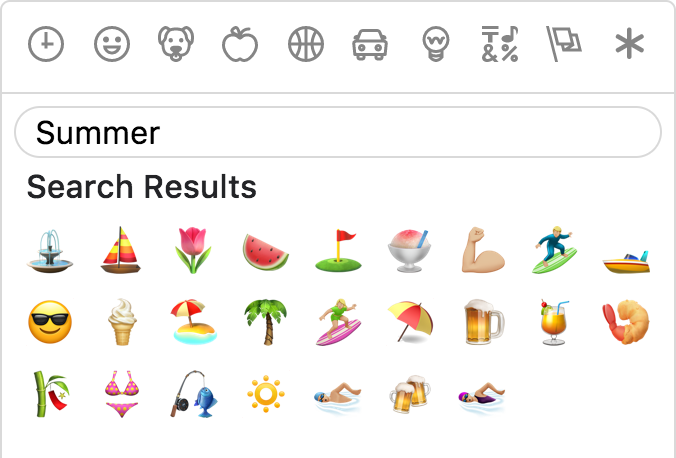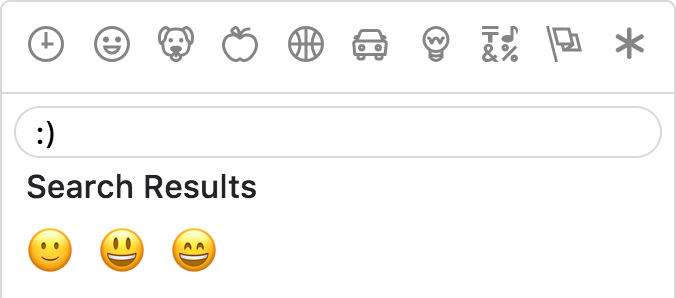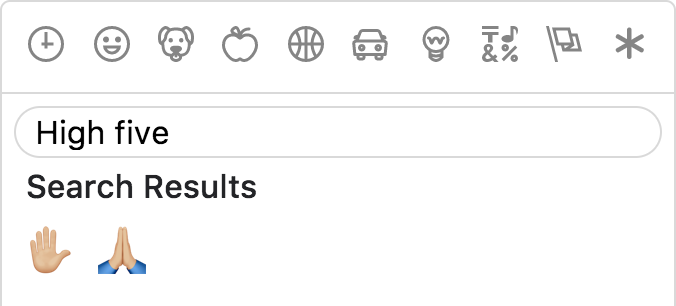It's a fork of emoji-mart. A main purpose of using this package is to reduce your package size. With emoji-mart, bundle sizes will be around 600kb+ (minified). With mr-emoji, bundle sizes will be around 250kb (minified). And you will have pretty icons too. We have removed few things like, there will be only Apple icons available and you can not change the skin of emoji. We have added Parser to detect text with emoji.
Mr Emoji is a Slack-like customizable
emoji picker component for React
Demo • Changelog

Brought to you by the Missive team
npm install --save mr-emoji
import { Picker } from 'mr-emoji'
<Picker set='emojione' />
<Picker onClick={this.addEmoji} />
<Picker title='Pick your emoji…' emoji='point_up' />
<Picker style={{ position: 'absolute', bottom: '20px', right: '20px' }} />
<Picker i18n={{ search: 'Recherche', categories: { search: 'Résultats de recherche', recent: 'Récents' } }} />| Prop | Required | Default | Description |
|---|---|---|---|
| autoFocus | false |
Auto focus the search input when mounted | |
| color | #ae65c5 |
The top bar anchors select and hover color | |
| emoji | department_store |
The emoji shown when no emojis are hovered, set to an empty string to show nothing | |
| include | [] |
Only load included categories. Accepts I18n categories keys. Order will be respected, except for the recent category which will always be the first. |
|
| exclude | [] |
Don't load excluded categories. Accepts I18n categories keys. | |
| custom | [] |
Custom emojis | |
| recent | Pass your own frequently used emojis as array of string IDs | ||
| emojiSize | 24 |
The emoji width and height | |
| onClick | Params: (emoji, event) => {} |
||
| perLine | 9 |
Number of emojis per line. While there’s no minimum or maximum, this will affect the picker’s width. This will set Frequently Used length as well (perLine * 4) |
|
| i18n | {…} |
An object containing localized strings | |
| native | false |
Renders the native unicode emoji | |
| set | apple |
The emoji set: 'apple', 'google', 'twitter', 'emojione', 'messenger', 'facebook' |
|
| sheetSize | 64 |
The emoji sheet size: 16, 20, 32, 64 |
|
| backgroundImageFn | ((set, sheetSize) => …) |
A Fn that returns that image sheet to use for emojis. Useful for avoiding a request if you have the sheet locally. | |
| emojisToShowFilter | ((emoji) => true) |
A Fn to choose whether an emoji should be displayed or not | |
| showPreview | true |
Display preview section | |
| emojiTooltip | false |
Show emojis short name when hovering (title) | |
| skin | 1 |
Default skin color: 1 |
|
| style | Inline styles applied to the root element. Useful for positioning | ||
| title | Emoji Mart™ |
The title shown when no emojis are hovered |
search: 'Search',
notfound: 'No Emoji Found',
categories: {
search: 'Search Results',
recent: 'Frequently Used',
people: 'Smileys & People',
nature: 'Animals & Nature',
foods: 'Food & Drink',
activity: 'Activity',
places: 'Travel & Places',
objects: 'Objects',
symbols: 'Symbols',
flags: 'Flags',
custom: 'Custom',
}import { Parser } from 'mr-emoji'
<Parser data="Hello there!" />
<Parser data="Hello there! :grinning:" />
<Parser data="Hello there! :grinning: Nice to meet you." />Sheets are served from unpkg, a global CDN that serves files published to npm.
| Set | sheetSize | Size |
|---|---|---|
| apple | 16 | 334 KB |
| apple | 20 | 459 KB |
| apple | 32 | 1.08 MB |
| apple | 64 | 2.94 MB |
{
id: 'smiley',
name: 'Smiling Face with Open Mouth',
colons: ':smiley:',
text: ':)',
emoticons: [
'=)',
'=-)'
],
skin: null,
native: '😃'
}
{
id: 'santa',
name: 'Father Christmas',
colons: ':santa::skin-tone-3:',
text: '',
emoticons: [],
skin: 3,
native: '🎅🏼'
}
{
id: 'octocat',
name: 'Octocat',
colons: ':octocat',
text: '',
emoticons: [],
custom: true,
imageUrl: 'https://assets-cdn.github.com/images/icons/emoji/octocat.png?v7'
}import { Emoji } from 'mr-emoji'
<Emoji emoji={{ id: 'santa', skin: 3 }} size={16} />
<Emoji emoji=':santa::skin-tone-3:' size={16} />
<Emoji emoji='santa' set='emojione' size={16} />| Prop | Required | Default | Description |
|---|---|---|---|
| emoji | ✓ | Either a string or an emoji object |
|
| size | ✓ | The emoji width and height. | |
| native | false |
Renders the native unicode emoji | |
| onClick | Params: (emoji, event) => {} |
||
| onLeave | Params: (emoji, event) => {} |
||
| onOver | Params: (emoji, event) => {} |
||
| fallback | Params: (emoji) => {} |
||
| sheetSize | 64 |
The emoji sheet size: 16, 20, 32, 64 |
|
| backgroundImageFn | ((set, sheetSize) => `https://unpkg.com/emoji-datasource@3.0.0/sheet_${set}_${sheetSize}.png`) |
A Fn that returns that image sheet to use for emojis. Useful for avoiding a request if you have the sheet locally. | |
| tooltip | false |
Show emoji short name when hovering (title) | |
| html | false |
Returns an HTML string to use with dangerouslySetInnerHTML |
Certain sets don’t support all emojis (i.e. Messenger & Facebook don’t support :shrug:). By default the Emoji component will not render anything so that the emojis’ don’t take space in the picker when not available. When using the standalone Emoji component, you can however render anything you want by providing the fallback props.
To have the component render :shrug: you would need to:
<Emoji
emoji={'shrug'}
size={24}
fallback={(emoji) => {
return `:${emoji.short_names[0]}:`
}}
/>The Emoji component being a functional component, you can call it as you would call any function instead of using JSX. Make sure you pass html: true for it to return an HTML string.
<span dangerouslySetInnerHTML={{
__html: Emoji({
html: true
set: 'apple'
emoji: '+1'
size: 24
})
}}></span>You can provide custom emojis which will show up in their own category.
import { Picker } from 'mr-emoji'
const customEmojis = [
{
name: 'Octocat',
short_names: ['octocat'],
text: '',
emoticons: [],
keywords: ['github'],
imageUrl: 'https://assets-cdn.github.com/images/icons/emoji/octocat.png?v7'
},
]
<Picker custom={customEmojis} />The Picker doesn’t have to be mounted for you to take advantage of the advanced search results.
import { emojiIndex } from 'mr-emoji'
emojiIndex.search('christmas').map((o) => o.native)
// => [🎄, 🎅🏼, 🔔, 🎁, ⛄️, ❄️]By default MrEmoji will store user chosen skin and frequently used emojis in localStorage. That can however be overwritten should you want to store these in your own storage.
import { store } from 'mr-emoji'
store.setHandlers({
getter: (key) => {
// Get from your own storage (sync)
},
setter: (key, value) => {
// Persist in your own storage (can be async)
}
})Possible keys are:
| Key | Value | Description |
|---|---|---|
| skin | 1, 2, 3, 4, 5, 6 |
|
| frequently | { 'astonished': 11, '+1': 22 } |
An object where the key is the emoji name and the value is the usage count |
| last | 'astonished' | (Optional) Used by frequently to be sure the latest clicked emoji will always appear in the “Recent” category |
Not only does Emoji Mart return more results than most emoji picker, they’re more accurate and sorted by relevance.
The only emoji picker that returns emojis when searching for emoticons.
For better results, Emoji Mart split search into words and only returns results matching both terms.
As the developer, you have control over which skin color is used by default.
It can however be overwritten as per user preference.
Apple / Google / Twitter / EmojiOne / Messenger / Facebook
Emoji Mart doesn’t automatically insert anything into a text input, nor does it show or hide itself. It simply returns an emoji object. It’s up to the developer to mount/unmount (it’s fast!) and position the picker. You can use the returned object as props for the EmojiMart.Emoji component. You could also use emoji.colons to insert text into a textarea or emoji.native to use the emoji.
$ yarn build
$ yarn start
$ yarn storybookPowered by iamcal/emoji-data and inspired by iamcal/js-emoji.
🙌🏼 Cal Henderson & https://github.com/missive/emoji-mart.









